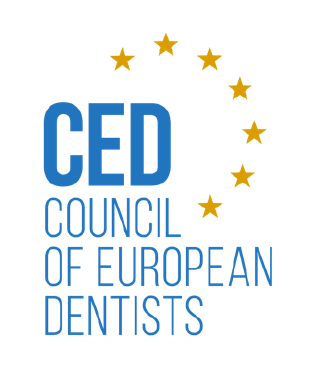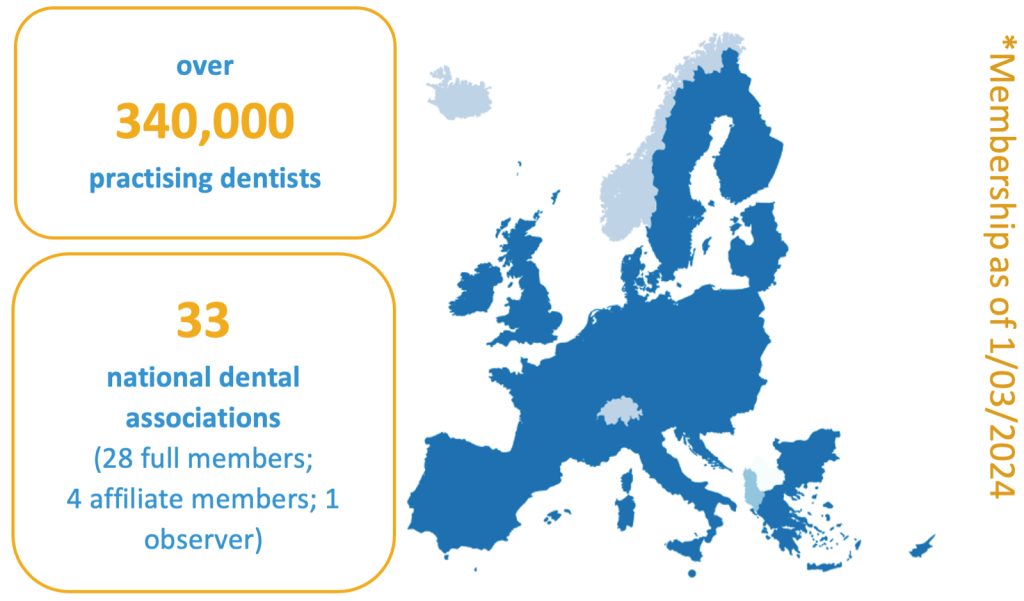2024 Manifesto
for the new EU mandate

European dentists call on EU decision makers to:
Prioritise patient safety and oral health across Europe:
- Prevention in relation to oral health should be prioritised and promoted within national healthcare systems, ensuring a reduction of costs, reducing the burden of disease, and improving public health as a whole. Special attention must be paid to social inequalities, placing the most vulnerable groups of citizens in danger of long-term negative effects on their health due to lack of access to oral healthcare.
- Dentists save lives – oral cancer remains a pressing concern in Europe, as highlighted in Europe’s Beating Cancer Plan, and dentists play a crucial role for early detection and intervention. As such, we encourage you to support dentists in raising awareness about oral cancer prevention and the importance of facilitating access to screenings and treatment options for patients.
- Dentistry will suffer a significant crisis by the loss of antibiotics as effective agents against human infection due to antimicrobial resistance (AMR). We call on you to focus part of your mandate on the need to develop effective policy strategies for responsible antibiotic use though close collaboration with the dental profession.
- Dental medical devices may become unavailable due to the burdensome re-certification processes under the Medical Device Regulation (MDR 2017/745), ultimately placing the oral healthcare needs of patients in jeopardy. Provenly safe medical devices should be allowed to remain on the market in a streamlined manner.
Read more here: CED White Paper Oral Care: Prevention is better than cure/ Updated CED Resolution on Vaccination/ CED Resolution on antimicrobial resistance/ CED Statement on Dentistry and the Medical Devices Regulation (MDR)/ CED Statement on the implementation of the Medical Devices Regulation
Ensure that EU policy works for a balanced European dentist workforce
- Update the provisions on basic training of the Professional Qualifications Directive (PQD 2005/36) through its Annex V.3/5.3.1. Annex V remains outdated and fails to capture the contemporary competences, skills, and techniques required to meet the challenges of the modern dental landscape successfully.
- Help ensure that the recognition of dental qualifications, obtained outside the EU is complete and in accordance with the applicable requirements before a dentist may start practising dentistry for the first time in the EU. Examples include rigorous scrutiny of third country qualifications, consistent recognition process, alignment with European standards and clear language requirements.
- Prioritise actions that enable Member States national governments to implement policies that support appropriate workload, continuing education, favouring retention of the dental workforce as part of their health workforce initiatives and strategies.
Read more here: Revised CED Resolution on Annex V.3/5.3.1 of Directive 2005/36/EC (PQD)/ Justification for the proposed changes of CED on Annex V.3/5.3.1 of Directive 2005/36/EC (PQD)/ CED Position on the Recognition of Dental Professional Qualifications acquired in Third Countries/ CED Position on Dental Workforce/ CED White Paper on workforce challenges
Work towards a digital health future that does not impede the profession and delivery of care
- Ensure that major legislative developments in the field of eHealth, such as the European Health Data Space are truly workable and implementable. Developments in digital health policy must also account for the financial and administrative burdens they bring for dentists across all practices, especially for small and micro enterprises. Furthermore, developments in eHealth must also take into account the fact that there are many discrepancies and variations in progress among Member States (MS) when it comes to use of electronic health records and dental data specifically. As such, policy and legislation on digital health must take these factors into account from start to finish of the legislative process and the following implementation in order to achieve a successful and sustainable eHealth architecture in the EU.
- The safety and privacy of the patient, the healthcare professional and also of the privileged relationship between the two must not be jeopardized: as such, digital exchange of information on patients’ data and records must be failproof and protected from misuse and exploitation at all costs.
- Developments in eHealth and artificial intelligence (AI) cannot replace the expertise of the dentist from diagnosis to treatment and follow-up care. We encourage you to ensure that patients are protected from exploitation by commercial entities that use AI advancements to deliver dangerous treatments that exclude the dentist from the process. An example would be the increased marketing of Do-It-Yourself/Direct-To-Consumer orthodontics, potentially placing patients at risk since the procedure does not involve a comprehensive orthodontic diagnosis and treatment progress is not adequately supervised by a qualified dentist and/or specialist orthodontist.
Read more here: CED Position on European Health Data Space/ CED Statement on eSkills for dentists/ CED Position on ‘Direct to Consumer Orthodontics’, Artificial Intelligence (AI) and Dentistry
There are on average 76 practising dentists per 100.000 people in Europe
Dentists continue being the 5th most mobile profession in Europe
On average, Europeans have 1.3 consultations with a dentist per year, a figure that dropped by 15% during the COVID-19 pandemic
Untreated dental caries remains the most common non-communicable disease worldwide (NCD)
The European region has the highest prevalence of major oral health diseases, affecting 50.1% of the adult population
Oral cancer is the 13th most common cancer worldwide
Spending on dental services represents on average about 5.1% of total health expenditure in European countries, below average as compared to pharmaceuticals and medical devices
In 2022, 4.8% of the EU population aged 16 or over had an unmet need for a dental examination or treatment
About the Council of European Dentists:
The Council of European Dentists (CED) is the representative organisation for the dental profession in the EU, representing over 340,000 practising dentists through 33 national dental associations. Established in 1961 to
advise the European Commission on matters relating to the dental profession, the CED promotes high standards of oral healthcare and effective patient-safety centred and evidence-based professional practice across Europe.
Resources:

World Health Organization, Global oral health status report: towards universal health coverage for oral health by 2030. Summary of the WHO European Region;
https://www.who.int/europe/publications/
European Commission, Regulated Professions Database;
http://ec.europa.eu/growth/tools-databases/
European Commission, Eurostat, Unmet health care needs statistics,
https://ec.europa.eu/eurostat/statistics-explained/
Organisation for Economic Co-operation and Development (OECD), Health at a Glance: Europe 2022: State of Health in the EU Cycle;
https://www.oecd-ilibrary.org/sites/
European Observatory on Health Systems and Policies, Oral health care in Europe: Financing, access and provision;
https://eurohealthobservatory.who.int/publications/
World Health Organisation (WHO), Oral Health,
https://www.who.int/news-room/fact-sheets/
